SpaceX made history last night (Dec. 21) in Cape Canaveral, Florida. The company, amid much jubilation, landed a Falcon 9 reusable rocket that had shortly before been in orbital space delivering satellites.
It was a major step for the company, founded by Elon Musk, co-founder of PayPal and Tesla Motors. SpaceX suffered a serious setback in June when a Falcon 9 bound for the International Space Station exploded after a few minutes of flight.
It was also a major step for private companies in space. The rocket carried a payload of 11 satellites owned by SpaceX customer Orbcomm, a communications firm based in New Jersey.
Because they’re used more than once, reusable rockets make space access considerably cheaper, saving private space companies tens of millions of dollars and promising to make them financially viable entities. Conventional rockets, by contrast, are discarded following each launch, significantly driving up costs.
Another private space company, Blue Origin—started by Amazon CEO Jeff Bezos—also launched and landed a reusable rocket last month. But that rocket is designed for carrying tourists to the edge of orbital space, not into it.
